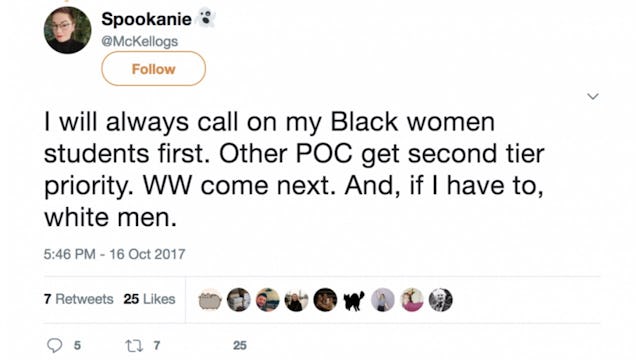This Instructor Calls On Black Women First, And Enraged White Dudes Want Her Fired

As a black woman, I frequently feel overlooked in conversations. Then, when I am included, people will say something to me like, “You’re very articulate.” Which is some racist-ass bullshit, as if because I’m a black woman, I’m not going to be able to carry a conversation and make a point.
People — especially white people — have long been surprised by my intelligence and ability to hold my own and speak critically in conversations. I’ve become accustomed to it, but that doesn’t mean it’s not a serious problem. It is.
So, when I heard the story about Stephanie McKellop, a PhD student and teaching assistant at the University of Pennsylvania who is using a method called “progressive stacking” and calling on the black women in her classes first, then other POC, then white women, and lastly white men, I was intrigued and pleased with her decision.
Screenshot / Twitter
Being a black woman in a classroom setting is even more of a challenge than just being a black woman in a conversation, and Stephanie recognizes that truth and wants to help.
Of course, she is getting major pushback from her statement, which she shared via a tweet (she has since made her Twitter account private). If you guessed that white men are the ones leading the charge to have this woman fired because they think she’s “discriminating” against them, well, you would be right.
We all know that white men are really freaking out right now about their comfortable white privilege being threatened, so it’s no surprise that they’re the ones who are most vocally outraged. Many have called for her removal from the classroom, and the university is considering a course of action, because heaven forbid, white men don’t get to have a say in conversations first.
What is this world coming to? I mean, how can we uphold the white supremacist patriarchy if we are allowing WOC to have an active voice in college classrooms? The horror!
Here’s the thing: Black women have been shit on for always. We have sacrificed our bodies and our souls countless times for the sake of others and usually get very little in return. Black women give 100% of themselves, and then someone (often a white person, and usually a white woman) will come in and take credit for our work.
Most recently, it was the #MeToo movement. The hashtag spread like wildfire, and it took nearly a week before the truth to emerge that it was created by a black woman years ago.
When the Women’s March was first announced ahead of the inauguration in January, it was called the Million Women’s March. The problem is, there was already a Million Woman March that had occurred in 1997. It was organized by, and was aimed toward, black women. So when it got co-opted for the #resistance, with no credit given to the women who started the movement, it was a slap in the face to WOC. Actually, it was a double slap, because originally, there were no black women involved in the organization of the Women’s March.
These are just two examples, but there are countless others out there.
The co-opting of our mental and emotional labor is nothing new, but that doesn’t mean it is any less frustrating every time it happens. That’s why it is so refreshing to see McKellop giving black women the space to contribute where they are so often silenced. Black women are often glossed over and ignored, especially in academia, so having someone give our thoughts a platform to be heard is so important.
Fun fact: In the 2013–14 academic year, 64% of black women have received bachelor’s degrees, and 66% have earned associate degrees, the highest amount of any race. If we are some of the most educated, then why is it such a fight to be heard? Why are the black women who put themselves on the line always the first ones to get steamrolled for the sake of others?
Black women are fine when we’re entertaining people in some way, or if you can somehow turn us into a funny GIF or meme, but when we’re just regular people who have something to say? We’re swept under the rug. Ignored. Invalidated. So many people have heart eyes for Michelle Obama, Oprah, or Maxine Waters, but don’t extend the same type of love to the black women who don’t have the same platform or celebrity status.
As a writer, I’ve written countless essays that would be better received if I was a white woman. But because I’m black, people often dismiss my point of view. I also know that I am afforded a platform that many other black women don’t have, and therefore I try to use it the best way I can, which is why I’m addressing this issue and showing my public support (and appreciation) for women like Stephanie McKellop.
While there may be angry white people who will vehemently oppose McKellop and her progressive methods, as a black woman, I wholeheartedly support her. I’m grateful to her for giving black women a platform to be heard because we are intelligent, amazing, and there are things we need to say (and things you need to hear).
This article was originally published on